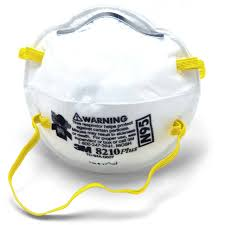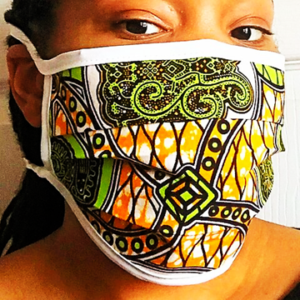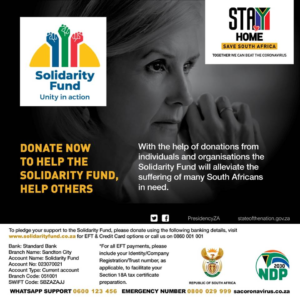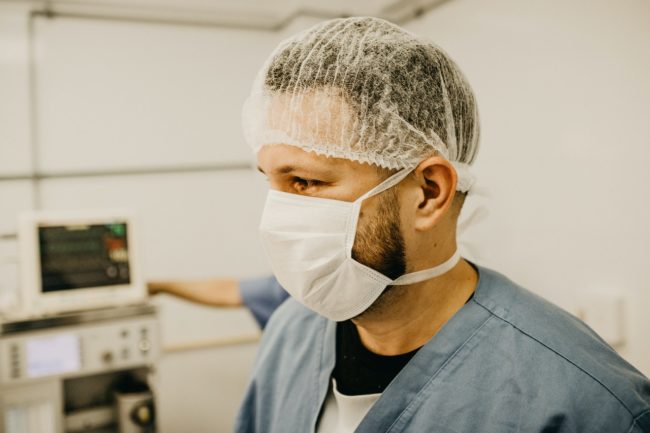Business for South Africa (B4SA) calls on all businesses and the public to heed Government’s call to reserve ALL medical-grade masks, including N95 respirators and medical surgical masks, for the exclusive use by frontline health care workers. Government has also recommended that members of the public and businesses wear cloth masks, and has provided guidelines for their manufacture and use.
As B4SA, our commitment is to do everything in our power to support frontline doctors, nurses and community health care workers across both the public and private sector, by ensuring they have access to the critical protective equipment necessary to keep them safe, especially as we head deeper into the Covid-19 pandemic.”
To date, B4SA has procured PPE worth R400 million, and has pipeline funding for a further R360 million, bringing the current spend for procurement to R760 million. Stock procured to date includes: 900 000 sterile gloves, 20 000 face shields, 1.12 million N95 masks for frontline medical staff, 6 million surgical masks for health care workers, 8.5 million surgical masks for patients and 200 ventilators. The team’s current focus is to secure the country’s PPE stock for the next 6-8 weeks, and monthly thereafter.

B4SA would like to express appreciation to the funders of Business for SA’s overall PPE procurement strategy: the Solidarity Fund, Motsepe Foundation, RMB/FNB’s SPIRE Fund and Naspers.
We would like to recognise and thank all doctors, nurses and community health care workers for their unconditional commitment, courage and dedication to ensuring South Africans remain safe.
PROTOCOLS FOR APPROPRIATE USE OF FACE MASKS
The following guidelines, approved by the National Department of Health and the NICD, provide clarity on the appropriate use of cloth masks by non-health care workers and the public. Please note that medical-grade masks, including N95 respirators and surgical masks, SHOULD ONLY be used by frontline doctors, nurses and community health care workers. Everyone else should use well-made cloth masks.
Masks are an effective way to stop the spread.

Well-made cloth masks do not replace the 5 Golden Rules of Good Hygiene. They may offer some extra protection, if well-made and used correctly.
5 Golden Rules of Good Hygiene to stop the spread of coronavirus:
- Wash your hands often, for at least 20 seconds with soap and water.
- Do not touch your face with unwashed hands.
- Cough or sneeze into a tissue or your elbow. Safely throw away the tissue.
- Observe physical distancing – keep 1,5 metres apart from others.
- Stay home if unwell. Contact a hotline or your health care worker.
Use a cloth mask if you come into contact with people
- Using public transport.
- Shopping.
- Attending essential services.
While wearing the mask:
- Do NOT TOUCH YOUR FACE or fiddle with the mask.
- Remove the mask if it is wet.
When taking off the mask:
- Touch only the straps. NEVER touch the inside of the mask.
- Keep it in a container until you wash it.
- Wash your hands, with soap and water or hand sanitiser, after taking it off.
Caring for your masks:
- Have at a minimum two masks so that you always have a clean one ready.
- Do not share masks with other people.
- Wash the mask with soap and hot water.
- Dry the mask in the sun and iron it to disinfect it.
A good cloth mask:
Has three layers:
- Outer layers (faces towards other people): made from thick weave cotton like denim, calico, upholstery fabric or shweshwe. Must be water repellent, easy to clean and be quick drying.
- Inner layer (sits against the face): Can be made with the same material as the outer layer. Both polyester or nylon fabrics are preferred. Cotton can be used but this fabric can be highly water absorbent and become wet against skin.
- Middle/Filter layer: using the same fabric as inner/outer layer or fabric that is used in lining of suit jackets or formal coats.
- Avoid T-shirt material.
- Use fabrics that can be washed in hot water and ironed.
- Use Cloth/Fabrics that do NOT inhibit breathing.
- Is square with 3 pleats to fit well.
- Covers from above the nose to below the chin and up to the ears.
- Has straps that tie behind the head.

Advice for parents: When toddlers and children wear masks
- Adults must always assist, toddlers and children to put on a mask.
- Follow the rule of always washing hands when touching masks.
- Ensure that toddlers and children are under adult supervision when wearing a cloth mask.
- Ensure that children and teenagers are informed on caring, use, and precautions of using a cloth mask.
If you are sick with Coronavirus, or caring for someone who has it, speak to your health worker or hotline about what masks and protection to use.
The DTIC has developed guidelines for the production of cloth masks by textile and CMT companies: http://www.dti.gov.za/news2020/Guidelines_Masks.pdf
Contribute to the Solidarity Fund

The purpose and mandate of the Solidarity Fund, announced by President Cyril Ramaphosa, is to mobilise and coordinate efforts and resources from all South Africans and the international community to assist the most vulnerable South Africans to deal with the impact of Covid19 and the consequences of measures intended to slow its rate of infection.
Details on how to donate are available on the Fund’s website www.solidarityfund.co.za
FOLLOW US ON SOCIAL MEDIA
https://twitter.com/businessforsa
https://www.facebook.com/Business-for-SA-110191343959451/
https://www.linkedin.com/company/businessforsa
Official government regulations and guidelines on COVID-19
All official government regulations and guidelines are available at https://www.gov.za/coronavirus/guidelines
